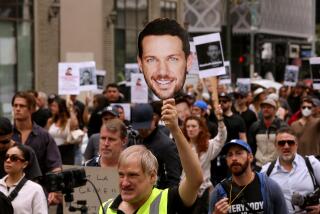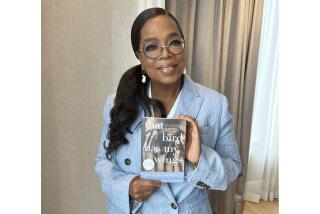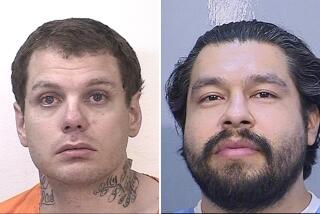Tookie Williams Is Executed
Stanley Tookie Williams, whose self-described evolution from gang thug to antiviolence crusader won him an international following and nominations for a Nobel Peace Prize, was executed by lethal injection early today, hours after Gov. Arnold Schwarzenegger refused to spare his life.
His death was announced at 12:35 a.m.
During the execution, the inmates friend Barbara Becnel and other supporters mouthed “God bless you” and “We love you” and blew kisses to Williams. Williams also seemed to mouth statements to Becnel.
The entire procedure took longer than usual. The execution team took about 12 minutes to find a vein in Williams muscular left arm. While the personnel were probing, Williams repeatedly lifted his head off the gurney, winced visibly, and at one point appeared to say: “Still cant find it?”
After Williams was pronounced dead, Becnel and two other supporters of Williams turned toward the media in the witness room and yelled in unison, “The state of California just killed an innocent man!”
Lora Owens, murder victim Albert Owens stepmother, appeared shaken, and was embraced by another woman.
Outside the gates of San Quentin as midnight approached, speakers urged calm. There was a moment of tension when a Williams friend, Fred Jackson, told the crowd, “Its all over.”
Angry shouts broke out. A woman sobbed on someones shoulder, and a man burned an American flag. As Jackson continued to urge calm, the crowd dispersed.
Speaking outside the gates of San Quentin after the execution, Becnel, who is taking possession of Williams body, called Schwarzenegger a “cold-blooded murderer” and vowed to work for his defeat in the next election.
Despite persistent pleas for mercy from around the globe, the governor earlier in the day had said Williams was unworthy of clemency because he had not admitted his brutal shotgun murders of four people during two robberies 26 years ago.
After the U.S. Supreme Court denied a request for a last-minute stay Monday evening, the co-founder of the infamous Crips street gang — who insisted he was innocent of the murders — became the 12th man executed by the state of California since voters reinstated capital punishment in 1978.
With its racial overtones and compelling theme — societys dueling goals of redemption and retribution — the case provoked more controversy than any California execution in a generation, and became a magnet for attention and media worldwide.
A long list of prominent supporters — as disparate as South African Bishop Desmond Tutu and rapper Snoop Dogg — rallied to Williams cause.
But in a strongly worded rejection of Williams request for clemency, Schwarzenegger said he saw no need to rehash or second-guess the many court decisions already rendered in the case, and he questioned the death row inmates claims of atonement.
Williams, the governor said in a statement, never admitted guilt, plotted to kill law enforcement officers after his capture, and made little mention in his writings of the scourge of gang killings, which the statement called “a tragedy of our modern culture.”
As night descended Monday, about 1,000 demonstrators who gathered on a tree-lined street leading to the gates of San Quentin State Prison endured frosty temperatures to protest the execution.
Joan Baez sang “Swing Low, Sweet Chariot” as speakers urged participants to keep fighting. Small clumps of people in scarves and gloves held candles and sang hymns, while others wandered off alone, gazing into the bay.
There were small, scattered protests around the state, including a candlelight vigil Monday night in Leimert Park.
A few death penalty supporters also turned out at San Quentin. Scuffles and shoving matches broke out on occasion, but no serious incidents were reported.
Behind the prisons thick walls, Williams passed his dwindling hours quietly, visiting with friends and talking on the telephone while under constant watch by guards.
An acquaintance described him sitting at a table, handcuffed, next to untouched turkey sandwiches, bidding goodbye to friends in an ordinary, everyday manner.
A prison spokesman said Williams was calm and upbeat, though he ate nothing but oatmeal and milk all day, refusing the privilege of a special last meal. Williams also declined a spiritual advisor.
The Rev. Jesse Jackson said he met twice with Williams, and together with Becnel delivered the news that the governor had denied clemency.
Williams smiled “as if he expected it,” Jackson said. He said Williams again denied his guilt, and said that he thought “his baggage as a Crip was on trial more than for the four murders.”
In recent statements, Williams had expressed a philosophical attitude about his own death. Fred Jackson, 67, who works with Internet Project for Street Peace, Williams gang intervention project, said the inmate struck that tone in a phone conference with an Oakland support group Sunday. “He said he doesnt fear death — he doesnt fear what he does not know,” Jackson said.
At 6 p.m., Williams was strip-searched, given a set of clean clothes and placed in a holding cell steps from the death chamber under nonstop observation by a sergeant and two officers.
Officials said he spent the evening watching TV and reading some of the roughly 50 letters that arrived Monday from as far as Italy and Israel — including some from schoolchildren. Many of them said they were praying for him.
Nearby, the injection team began its final preparations in the prisons converted gas chamber, ensuring that the required needles, tubes and chemicals were in place.
Williams son, Stanley Williams Jr., who is in High Desert State Prison serving a 16-year sentence for second-degree murder, will be notified in person of his fathers death by a chaplain and mental health specialist, prison officials said.
The younger Williams is in isolation for disciplinary problems, and would not normally have access to any news source.
Five members of the murder victims families were at the prison, although it was not clear how many witnessed the execution. Williams, who earlier said he didnt want to invite anyone to observe “the sick and perverted spectacle,” had five witnesses, including Becnel and members of his legal team.
Officials designated a total of 39 witnesses, including 17 media representatives.
Lora Owens said she did not expect the execution to end the ache over losing her red-haired stepson, Albert, who was killed with a shotgun at the age of 26 while working at a Pico Rivera 7-Eleven late one February night in 1979. But watching the killer take his last breath, she said, might help her “let it go” just a bit.
Advocates for clemency had argued that Williams had unmatched credibility as a messenger urging youths to say no to gangs.
But law enforcement officials and victims rights leaders portrayed Williams as a fraud whose influence on would-be gangsters was overblown.
Prosecutors said the absence of a confession, and Williams refusal to formally cut ties with the Crips by sharing his knowledge of gang tactics with police, disproved his claim of rehabilitation.
“What kind of message does that send to young children, when somebody like Mr. Williams, who supposedly has their attention, tells them, Dont snitch, dont talk to police, dont tell people who was involved in a crime?.” said John Monaghan, a Los Angeles County deputy district attorney.
As Schwarzenegger weighed his decision, attorneys for Williams spent the weekend hunting for a court that might issue a stay.
On Sunday, the state Supreme Court turned back arguments that his trial was “fundamentally unfair” in part because prosecutors had failed to disclose that a key witness, Alfred Coward, was a violent ex-felon. The U.S. 9th Circuit Court of Appeals and finally the U.S. Supreme Court followed suit Monday.
After the governor rejected clemency, lawyers asked Schwarzenegger for a stay on the basis of three witnesses who they said had come forward just this week with exculpatory information. But Schwarzenegger again delivered a rebuff.
Just before 9:30 p.m., Williams lawyers filed another petition, citing a fourth purported witness who claimed other inmates tried to recruit him into a scheme to frame Williams. The governor denied that, too.
Born in New Orleans, Stanley Tookie Williams III was named for his father but raised by his mother. Hoping to escape poverty and crime in Louisiana, the family moved to South Los Angeles in 1959.
He spent his youth as a delinquent, rebounding in and out of Central Juvenile Hall. In his writings, he admitted that he was a megalomaniac who beat, robbed and shot at the innocent.
By the 1970s, Williams was viewed as one of the more menacing toughs in South Los Angeles, weighing 300 pounds with biceps measuring 22 inches.
In a move he said he regretted more than any other, he helped launch the Crips — originally called the Cribs — and began terrorizing the streets.
On Feb. 27, 1979, he and three cohorts smoked cigarettes laced with PCP and, armed with a 12-gauge shotgun and a .22-caliber handgun, set out on a late-night search for a place to rob, according to court documents.
They wound up at the 7-Eleven where Owens, a father of two and Army veteran, was working the overnight shift. Owens was shot twice in the back.
Less than two weeks later, Williams broke down the door at the Brookhaven Motel and killed the motels owners, Taiwanese immigrants Yen-I Yang, his wife, Tsai-Shai Chen Yang, and their daughter, Yu Chin Yang Lin, who was visiting.
The two robberies netted $220.
In 1981, a jury in Torrance convicted Williams, landing him on death row. Initially his conduct was disruptive: “I gave this place hell,” he acknowledged in an interview.
While in solitary confinement, however, he began a transformation, Williams said. At first he read voraciously — the Bible, the dictionary, philosophy, black history — and struggled to understand his past.
By 1992, Williams was a changed man, he said, deeply remorseful for the bloody rampage the Crips had perpetrated across America — and for the gang life that lured in one of his two sons.
In 1994, Williams left solitary confinement and declared himself a champion of peace.
With the help of Becnel, he wrote a series of books warning youths away from violence and brokered gang truces in Los Angeles and New Jersey. Last year, his life became the subject of a TV movie, “Redemption,” starring Jamie Foxx, and his imposing appearance gradually gave way to a graying beard and spectacles.
Reached by phone at her Los Angeles home as the execution was underway, Williams ex-wife, Bonnie Williams Taylor, said, “This is an awful time. I want to be with my family.”
Earlier in the evening, dozens of people had gathered in Leimert Park in Los Angeles to oppose the execution. But the speakers who addressed them focused more on healing crime in black communities than on Williams plight.
“We have to understand,” said African American activist Eric Wattree, 53, speaking to a mostly black crowd early in the evening, “this is our failure taking place here.”
Times staff writers Dan Morain and Steve Chawkins in San Quentin and Jill Leovy, Lisa Richardson, Greg Krikorian, Louis Sahagun and Carla Hall in Los Angeles contributed to this report.
More to Read
Sign up for Essential California
The most important California stories and recommendations in your inbox every morning.
You may occasionally receive promotional content from the Los Angeles Times.











